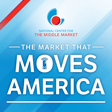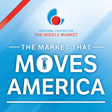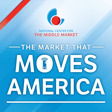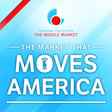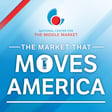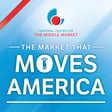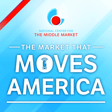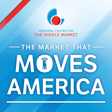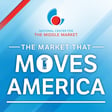Become a Creator today!Start creating today - Share your story with the world!
Start for free
00:00:00
00:00:01

Manufacturing Insights: Navigating Challenges and Innovations
Today, we're delving into one of the most crucial sectors of the middle market—manufacturing. Our guest, Mike Williams, Industry Practice Leader for Manufacturing at Chubb, offers valuable insights into the latest industry trends. Prepare for a dynamic conversation that unpacks the opportunities, challenges, and risks confronting businesses in this ever-evolving industry.
Chubb is the world’s largest publicly traded P&C insurance company and the leading commercial lines insurer in the U.S. With operations in 54 countries and territories, Chubb provides commercial and personal property and casualty insurance, personal accident and supplemental health insurance, reinsurance and life insurance to a diverse group of clients.
Transcript
Podcast Introduction
00:00:02
Speaker
Welcome to The Market That Moves America, a podcast from the National Center for the Middle Market. The center is the leading source of knowledge, leadership and innovative research on the middle market economy. Throughout our podcast, we will feature middle market leaders and stakeholders to hear their real world perspectives on trends and emerging issues.
Manufacturing Focus
00:00:21
Speaker
Welcome to The Market That Moves America. My name is Doug Farron, the managing director here at the National Center for the Middle Market.
00:00:28
Speaker
And in today's podcast, we're going to dive deeper into the one, one of the most important industries across the middle market, which is manufacturing. So joining me today is Mike Williams. Mike is the industry practice leader, uh, for manufacturing at job. Welcome, Mike. Thanks, Doug. Hey, appreciate the opportunity and thank you for the partnership with, uh, NCMM, which I know goes beyond manufacturing and.
00:00:54
Speaker
I can speak for Chubb as a whole that we appreciate the partnership. So thanks again. Yeah, no, we enjoyed as well. Been longtime partners.
Mike Williams' Background
00:01:02
Speaker
So why don't we just start? If you could tell us a little bit about your background, Mike, and your career and then kind of your experience across insurance manufacturing and particularly your scope of responsibility today with Chubb. Absolutely. First of all, Doug, I'm going to live vicariously through you because I started out on the West Coast.
00:01:24
Speaker
proud graduate of the 16th rank Washington State Cougars who have no conference next year. So maybe I can hang out with you next fall and watch some football someplace. But I did grow up on the West Coast and I've moved a number of times for job in my long spanning, which I won't tell you how many years commercial insurance career. But you know, when I look back over those moves, you know, it is interesting. You don't really realize at the time, but the
00:01:54
Speaker
Diversity that I have been able to experience in different geographies, different people, and different industries really has proven to be each one of them a great move in and of its own right.
Role at Chubb
00:02:09
Speaker
So that ranged from everything from number of years involved in the tech industry in Silicon Valley, to heavy food processing business, to everything ranging from metals, plastics, auto parts, et cetera, throughout the country.
00:02:24
Speaker
And that's led to my current role, which as you noted, I am responsible for the manufacturing industry practices at Chubb, which happens to be also our largest. And one of the positive things about it is not only is our largest, but we view it quite favorably. You know, it certainly has its challenges and, you know, we're going through things in the economy that,
00:02:50
Speaker
They are a little different than a few years ago, but as we look forward to the future, we see a lot of positivity in our involvement in the industry. And as a part of, you know, my responsibilities, really any policy that a customer interacts with us on that rolls up under a manufacturing SAC code rolls up into my area of responsibility. So whether that's property or liability or workers comp or foreign liability
00:03:20
Speaker
Cargo any of these other things We get involved in all those and as I travel around North America and especially through the Midwest, you know, Mid-Atlantic and Northeast where a lot of the business lies We interact with our customers in those areas. So yeah. Yep.
Modern Manufacturing Misconceptions
00:03:38
Speaker
Got it Well, hey, I'm gonna start first a very broad question, which is I
00:03:44
Speaker
You know, I think a lot of times manufacturing as an industry gets kind of a bad rap. I mean, there's a misconception about what that means. Um, you know, especially here, I, I work at a college campus, right? And a lot of our students here talk to them, they would say, Oh, you know, manufacturing floors are these loud, dirty, kind of, you know, undesirable places to be, but, um, kind of, would you just, you just describe,
00:04:12
Speaker
Like what you see across the customers that you work with, particularly the ones that are in the middle market. Yeah, you know, it's kind of funny because I deal with somewhat the same thing within Chubb. You know, I have a group that has dedicated themselves to becoming better in the manufacturing arena and becoming specialists in those areas. And I have somewhat of a selling point too. And one of the things that I talk to folks about is that
00:04:41
Speaker
No, manufacturing is not easy. It's got challenges to it. There isn't just a warehouse or just an office building. There's a manufacturing facility and then there's warehouses and there may be overseas manufacturing. There's shipments that go along with it. There's all the latest exposures associated with hacking and the like. So there's a lot
00:05:06
Speaker
to be excited about within those challenges. I mean, that's what makes it rewarding is that whether it's the direct manufacturer or us from an insurance perspective, we get to be involved in all those different things and analyze them. I go actually way back. My dad was a chemical engineer in a paper mill, so I kind of chuckle your question because I grew up going in and seeing loud and hot and dirty, and I thought it was really cool.
00:05:36
Speaker
So again back to your you know your buckets there. I'm kind of living vicariously with my involvement in manufacturing because of those days that I really enjoyed going into the paper mill and during college I worked in the paper mill at times, so there's a long history there, but you know the diversification that manufacturing brings and the opportunities for
00:06:01
Speaker
folks, whether it's coming out of high school or college or a mid-career change, whatever the case may be, leads to a lot of opportunity that somebody who's willing to make that dive to continue to develop their skills and be innovative, that's manufacturing these days. And oftentimes when I walk in, it looks more akin to a tech type operation than it does when you're, the reference you made to,
00:06:30
Speaker
dirty and noisy and hot and all that stuff. So exciting times.
Technology in Manufacturing
00:06:35
Speaker
Yeah, that's a great segue actually, because the first project that we worked on together, so the center and Chubb was back in 2018, you helped us with a study of advanced manufacturing in the middle market. So can you talk a little bit more about that? Like you just mentioned, like some of the technology, maybe some of the changes you've seen over the last five or 10 years. Sure.
00:07:00
Speaker
You know to build on those earlier comments, you know dynamic But the beauty of it is that whether it was five ten years ago or certainly now which probably is even more correct is that manufacturing is the backbone of the economy and You know the things that we see going on these days Really lead to excitement for the future but you know the the risk
00:07:30
Speaker
Oftentimes, as I alluded to, is often closely aligned to what a tech company might have. One of the things that we talked about back in 2018 was technology on the factory floor. And as everyone can imagine, that has not gone backwards. And connectivity was a big part of that movement through the fourth industrial revolution.
00:07:55
Speaker
You know, because industrial revolutions are led by improvements in productivity, and that connectivity really is what has propelled a lot of what is going on now. Now, that brings risks with it as well that oftentimes I think people don't think about. But when you're connected to the outside world, you also leave yourself open to, in essence, the bad actor. But it's not just the manufacturer that's exposed because they're connected to their suppliers, they're connected to their customers.
00:08:25
Speaker
and therefore they have really a responsibility to protect their systems because they're protecting their suppliers and customers at all. You know, what's interesting, when you look at 2018, you look at today, Doug, so many of those issues that we talked about back then really are at the top of the list now, whether it's technology, the skilled labor, supply chain, and certainly, you know, when we talked about those types of things back then,
00:08:54
Speaker
None of us could have foreseen COVID and the acceleration of inflation that have only made some of these things worse. But just in time, inventory and things like that certainly have been changed since 2018. Geographic diversification of manufacturing is a bit changed since we would have talked five years ago.
00:09:22
Speaker
That's one of the reasons that we build out the team that we do internally because there just is so much change and we need people that really are the experts in it and they can help our customers. Yep. Yep.
Manufacturing Risks
00:09:37
Speaker
So to that point about risks and our latest middle market indicator, our semi-annual survey, which, you know, Chubb has a lot of input on that, we noticed that
00:09:49
Speaker
Some of the top risks were the ones that you just mentioned. Like we look at the top three, it's essentially inflation recession, the talent issue, and then supply chain risks. All three of those rank among the highest. So how are manufacturers kind of thinking about those and maybe like how do you help prepare them for that or think through addressing those risks? You know, one of the things that we work with our customers on is just planning ahead.
00:10:19
Speaker
Uh, you know, that's, it doesn't matter what we're talking about, but that seems like it's oftentimes an answer, but, you know, having a business continuity plan that, uh, allows you to be nimble and, and, and think ahead rather than being reactive, um, really becomes a very, very important in state age. You know, when you think about supply chain and where we were, which, um, you know, fortunately knock on wood, things have not perfect, but things have gotten better.
00:10:49
Speaker
But if a manufacturer was not diversified, whether that be geographically or number of suppliers or whatever the case may be, ports of entry, they probably experienced more problems a couple of years ago than the ones that were. So we work with our customers on really developing some of those kind of plans and helping them think ahead.
00:11:17
Speaker
Obviously, reshoring and nearshoring have been popular. It was starting before even 2018, if nothing else, based on costs overseas, but it's certainly accelerated. But that brings new risks with it, whether that be because the customer or the manufacturer has brought more raw materials or finished materials into their facility and maybe they're taxing the sprinkler system.
00:11:46
Speaker
or they're opening up a new facility and where they put that facility could be challenging from say a weather standpoint. So our folks will help in advance to assess some of those risk and hopefully help, you know, make some decisions there that will help down the line. Yeah. We, you know, we, we also track performance of these companies. Two of the things that we measure closely are their top line revenue growth,
00:12:15
Speaker
as well as their employment growth. For middle market manufacturing, the performance appears to be really strong. For instance, the average top line revenue growth was over 12%, which is a little bit higher than the rest of the US middle market. They also added people over the last year at close to 10%, which is 2.5 percentage points higher than a year previously. Are you seeing that as well?
00:12:45
Speaker
the growth and obviously taking on new risks, but does that resonate when you hear some of those growth numbers? No, absolutely. We're seeing the top line sales growth continue. I've seen that slow down a little bit, which probably is not a significant surprise. Keep in mind that when we track it, what we're looking at is what our customers are forward thinking.
00:13:14
Speaker
for the next 12 months. So, we've seen that slowed down a little bit, but as you know, slowing down a little bit does not mean that's gone negative. It's still a very positive number. What hasn't slowed down really is what we're seeing on, you talk about the labor side, and that very much continues to be a challenge for our customers. We have seen our customers do things like,
00:13:43
Speaker
partner with community colleges, they've started apprenticeship programs and they're working within to develop skills and the current employees to provide opportunities. You read about, there was one I read last week about Minneapolis public schools starting a program that wasn't tailored just towards manufacturing, but that was one part of it. But to help get at some of these issues as
00:14:09
Speaker
You know, our young folks come out of high school and then ultimately do they go to college or do they immediately go to the workforce? And those things are really important. Even if it's slowing down just a little bit here and who knows where the economy will go over the next year and a half or so, but it does appear that there continues to be resilience and strength that's going to continue on for someone knowing timeframe here.
00:14:36
Speaker
Yeah, back to the talent issue, is it just not having enough people or is it not having the right skills or is it really sounds like it could be kind of both? Well, I think it's really both. Yeah. And I mean, we see it in the insurance industry. The unemployment rate is low. Manufacturing has evolved. So the manufacturers today oftentimes are looking for skills that involve
00:15:06
Speaker
working with the computer more than perhaps directly on the piece of machinery. So the skill shortage really is an issue. And some of those things that I outlined I think are really important for the ongoing success of finding folks to fill what are probably going to become more and more sophisticated jobs all the time. And one of the results is that manufacturers are using
00:15:35
Speaker
you know, technology and automation more than what we saw back in 2018 when we did that report, certainly. And that helps deal with the skill labor shortage a bit, but it also requires a different skill level when you do go and hire folks. So it's going to continue to be a challenge. One of the areas that we do see as a challenge for risk and for the insurance industry is temporary employees.
00:16:05
Speaker
Probably no surprise to anyone, but from what we can tell from talking to our customers and from what I see, frankly, in some losses, is that the usage of temporary employees has increased over that five-year period. And contractual controls that our customers are able to put in place really become very, very important because they can end up with liability concerns and end up, frankly,
00:16:34
Speaker
losses in a couple of different areas that they perhaps didn't think about because they brought a temporary employee in who obviously is not familiar with that manufacturing facility, is new and perhaps thrown into areas that they're not real comfortable with. That's one area that is concerned that if I can have folks pay a little bit closer to contracts, it'd be great.
00:17:02
Speaker
Capital investment, because this is another thing that we monitor through that MMI survey. Manufacturers are telling us that they are reinvesting back into their businesses. Some of it, as you mentioned earlier, probably related to some of the reshoring, so that might require new facilities, bigger facilities, maybe warehouses, things like that. Also, some of the technology that you had mentioned earlier as well. What is that?
Capital Investments and Risk Assessment
00:17:29
Speaker
How does that change maybe some of the insurance profile when you say, hey, I'm going to buy some new machinery or expand into different parts of the country? I'm sure there's not only just the physical assets themselves, but maybe some of the catastrophic stuff, whether it be weather or water, as we see in different parts of the country. What should these manufacturers think about when they build out their companies that way?
00:17:56
Speaker
You know, the first comment I'll make is I had the opportunity to interact with supply chain consultant six months or more a year ago. And I had a couple calls with foreign manufacturers who were looking to come in the US. And one of the things that we have to remember is that what might be number one on our list for priorities for what we would like to see out of the existing facility or new facility might be like number seven or eight, you know, in comparison to
00:18:24
Speaker
you know, the ability to find skilled labor or just transportation, those sorts of things and logistics. So we have to keep that in mind. But the first thing I'd say is, you know, from a manufacturer's perspective, use the tools that are available to you, whether it be with your insurance broker or, you know, a may or may not be chub, but with your insurance company. And it's always easier to deal with things upfront than it is after the fact.
00:18:55
Speaker
I was just on the phone on one this morning where someone built a brand new facility and they sprinkled the office and not the manufacturing portion of it. Now they're going back and they're sprinkling the manufacturing part. It was a brief conversation. I don't know what the difference of cost is. I know what's going to cost them now, but I'm guessing they probably spend a couple hundred thousand dollars more to go back and fix this and if they had done it right the first time.
00:19:20
Speaker
They one of the things is these days is you know, I don't have to you know, you don't have to know anything about insurance You just have to watch the news of weather Whether it's you know hurricanes or tornadoes or hail or wind and the one that used to not be frankly too big a deal for manufacturing outside of maybe wineries was wildfire and
00:19:46
Speaker
You know, it's important to think ahead as well as a part of that plan, because, you know, depending on what somebody does or does not believe about weather patterns or global warming, if you do believe that perhaps, you know, some of this is going to continue to get worse, where you build now may be a problem for you 10 years from now. And none of us obviously know, but we're trying to think ahead on those kind of things. Yeah. And, you know, again,
00:20:16
Speaker
We recognize logistics and all those sorts of things, but issues like catastrophes and adequacy of sprinkler protection as a manufacturer brings, say, more raw materials in, or maybe they have more finished goods. Maybe they changed it. You talk about capital investment. One of the areas that we see quite a bit of capital investment going in is just the usage of some form of the lithium family of batteries.
00:20:46
Speaker
you know, you introduce lithium ion batteries into a facility that was not designed for that. Um, you know, it can become an issue and there are ways to protect that. But like I said earlier, they're a whole lot easier to deal with, uh, upfront than they are after the fact. Right. Right. Use your broker, use your carrier. Uh, there are resources that can help you. Okay.
AI in Risk Management
00:21:10
Speaker
Hey, so one other thing I wanted to ask you about, because it seems to be coming up in a lot of conversations, that's artificial intelligence. Are any of your customers asking questions about it, or do you hear any discussions? Because our data would suggest that a very small percent, I mean, less than 10% of all middle market companies say that they're actively using it right now, but it seems to be just a hot topic of conversation. I was just curious if you hear any of those types of
00:21:40
Speaker
conversations going on with the manufacturers you talk with? Sure. Hot topic on earnings calls, isn't it? That's not a manufacturing comment, but that's in general. Yes, it does come up. What I will say is that over time, our evolution of how we're trying to help our customers has evolved and starting to evolve in that direction. If you go back, things like
00:22:08
Speaker
telematics and automobile and how you manage your auto fleet more effectively. We've had a lot of success utilizing IoT water sensors to help cut down on water losses so that people know when there's a leak more effectively. Some of these can shut them off, shut the water off these days. And water in some areas has been a real problem, not so much in manufacturing. So I'm kind of excited about some of the things that are
00:22:37
Speaker
Coming out that we're starting to use in conjunction with our customers to help reduce risk And in a couple that are notable are along the workers comp arena frankly and they deal with managing ergonomics and cutting down frequency and they can range from you know a simple taking of a video on a cellular phone and Uploading that video and then having an analysis done of it
00:23:07
Speaker
Or one that's really cool is that it overlays onto the insureds basically security cameras within the manufacturing facility. And what's really neat about it is not only can you go back, obviously you can watch the accident that happened, but what's important is that it can catch
00:23:27
Speaker
things that nobody ever would have known about because nothing actually happened, even though what occurred was not what should have the employee or the forklift driver or whatever should have been doing, also known as near misses. And those things can be set up so that whoever monitors those gets an instant video image. Maybe they get at the end of the day, whoever they set it up. But there's some pretty interesting analysis on
00:23:55
Speaker
how the training opportunities that come out of the near misses, if you will, that were kind of ignored before because nobody knew about them, have cut down on frequency of workers comp claims and just incidents quite dramatically. So I believe, to your point, it's going to continue to evolve. It's getting a lot of attention. And those are the areas that right now we're using it the most.
00:24:24
Speaker
You know, the one thing I do wonder about too, as I mentioned earlier, the fourth industrial revolution. And, you know, those are changes that result in increased productivity. And does artificial intelligence start to bring on a fifth industrial revolution? That's not for me to decide, but yeah, we'll leave that for a future discussion.
Podcast Conclusion
00:24:43
Speaker
That's a probably a great place for us to wrap. Hey, Mike, I really appreciate your time. The discussion was was really great and
00:24:52
Speaker
Again, just appreciate the partnership that we have with the folks at Chubb. It's been great for us to provide, you know, different resources and work together to help support middle market companies. So again, appreciate it. No, thank you, Doug. It's always great to talk to you and work in partnership with NCMM and have the opportunity to talk about how Chubb can more effectively help our customers get through what's an exciting, but challenging industry as well. Yeah, absolutely.
00:25:20
Speaker
Well, great. For more information about a lot of the great resources that Chubb puts out there, really for a number of industries, not just manufacturing, you can go to www.chubb.com forward slash us dash en forward slash businesses forward slash campaign forward slash NCMM dash research. That was a mouthful, but
00:25:49
Speaker
Certainly welcome our listeners to go take a peek at all that great information. And again, you can reach our resources at www.middlemarketcenter.org. Appreciate your time and we'll talk to you again soon. Thanks. Thank you for listening to The Market That Moves America. Never miss a new episode by subscribing anywhere podcasts can be found. You can also subscribe to our email newsletter at middlemarketcenter.org.
